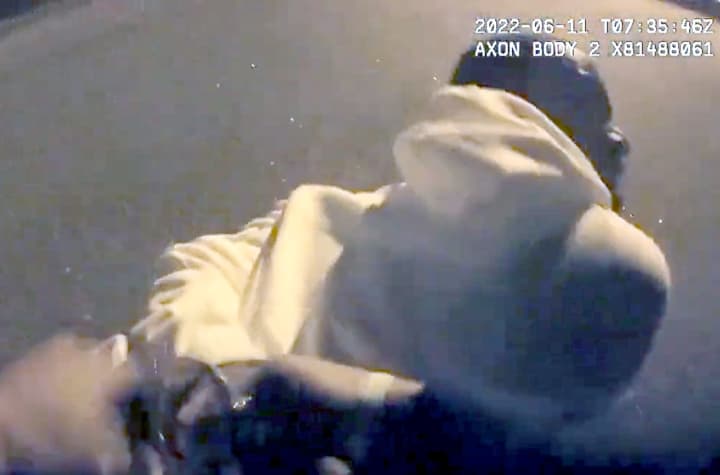Suddenly, two shots rang out and unarmed 28-year-old Khalif Cooper fell face down in the street.
Officer Jerry Moravek, who fired the shots, handcuffed Cooper, who is heard on police bodycam video telling him, "I don't got no gun."
He didn't have one, said New Jersey Attorney General Matthew J. Platkin in announcing on Monday, Feb. 6 that his office had charged Moravek with aggravated assault and official misconduct.
Moravek, 40, violated the state's use-of-force policy when he shot Cooper, leaving him unable to walk, after the sound of gunfire from somewhere in the area brought the two together, the attorney general said.
Moravek's actions "contradicted his police training and his oath to protect and preserve life," Platkin said. "(They) fall so far outside these confines — shooting an unarmed man in the back, resulting in a serious injury — that criminal charges are appropriate.
“The victim was never ever told to stop running,” the attorney general said. “He was not warned that deadly force might be used."
On the bodycam video released publicly by Platkin's office last summer, Moravek calls for an Advanced Life Support ambulance shortly before 3:30 a.m. June 11.
Then he turns over the handcuffed Cooper and asks him why he ran.
"I was scared," Cooper replies. "I don't got no gun, though."
A couple of screaming women arrive along with several uniformed officers who hold them back.
Moravek then heads back up the street, telling a colleague, "I saw him with a handgun."
He calls to another officer: "Did you get it?"
"Get what?" the other officer asks.
"You saw him with a gun here," Moravek says.
"Huh?" the other officer asks.
"You didn't see him with a gun here?" Moravek asks.
"He was runnin' from something. I don't know," the other officer replies. "He must've dropped it somewhere."
The officers begin searching the ground around parked vehicles on Garrison Street.
Seconds later, Moravek tells his colleagues he's found a black handgun between two cars.
"That's the one I saw him with," he says.
Platkin said Monday that the weapon wasn't “in the victim’s possession or within his reach.”
It also didn't match his DNA or fingerprints, the attorney general said.
In the end, Cooper was never charged with a crime.
Another man was arrested, though. Two other officers approached ex-con Dominique Capron, 28, of Paterson, who took off on foot, dropping a handgun as he went, authorities said at the time.
Capron was caught and charged with resisting arrest, hindering apprehension and various weapons offenses – including possessing a firearm as a convicted felon.
Defense attorney Patrick Caserta issued a statement Monday defending Moravek, saying that his client "believed his life and the life of other people in the street was at risk."
The officer "believed at that split-second that the person he was chasing was turning to fire that handgun at him and he realized that if he missed, the bullets could strike anyone nearby," Caserta added. "He made that split-second decision and fired his weapon.”
The ordinary state-mandated process involving any police shooting in New Jersey requirs an investigation by the attorney general's Office of Public Integrity and Accountability, followed by a grand jury hearing to determine whether it was justified.
The grand jury reviews a host of evidence -- including witness interviews, body and dashcam video, and forensic and autopsy results – before voting on whether or not there was cause to suspect any wrongdoing on the part of law enforcement.
This time, however, Platkin ordered pre-indictment criminal charges filed against Moravek.
“The body-worn camera footage does not depict the victim brandishing any firearm or pointing a firearm at the defendant, other officers or any member of the public,” he said.
“Under the law, discharging a firearm is meant to be a last resort, used by officers when they or the public face an imminent threat of death or serious injury," OPIA Executive Director Thomas Eicher noted. "That just wasn't the situation here."
The consequences for leaving Cooper with a disabling spinal injury must be as severe as the cost to the victim, he added.
Click here to follow Daily Voice Englewood and receive free news updates.


